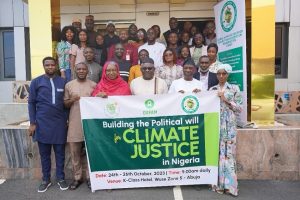A coalition of environmental rights activists, led by the Global Initiative for Food Security and Ecosystem Preservation (GIFSEP), has urged for greater political resolve to address the myriad environmental concerns confronting Nigeria.

One of the things they believe the country has to tackle as quickly as possible is how to implement the Climate Change Act (CCA 2021) and other laws that are intended to drive action and increase Nigerians’ resilience against climatic disasters.
“We need to build the political will for climate action,” says Michael Terungwa, founder and executive director of GIFSEP.
Speaking at a capacity-building workshop hosted by his organisation on Tuesday, October 24, 2023, and ending Thursday, October 26, 2023, in Abuja, with the theme “Building the Political Will for Climate Justice in Nigeria,” to train advocates on how to canvass for climate action, Terungwa noted that while citizens may dislike politicians for a variety of reasons, they have no choice but to partner with them because they have the power to effect the necessary change that is needed for sustainable development.
Unfortunately, understanding climate change issues is hard and, most times, complicated, and some lawmakers may not be aware of them. This is why he believes there is a need to get closer to them and show them why these laws are necessary.
This, he explains, is because politicians do not create political will; rather, they respond to it, and that is why, in his view, “it is actually up to us, the citizens, to make the political class build the political will.”
According to him, political will cannot be formed solely through protests and insults on social media; there are better alternatives, which is why GIFSEP gathered the campaigners together to help achieve that goal in a very skilled, respectful, and admirable way.
Nigeria has a Climate Change Act (CCA) that was passed into law in 2021. So, when asked what the government needed to do to improve its climate action, he said implementation, which cannot be done without funding.
For him, it is critical that advocates understand how to persuade the political class to prioritise policies that boost budgetary allocation for climate initiatives.
Another fundamental concern that the head of GIFSEP wants taken into consideration is the review of current regulations, such as the Environmental Impact Assessment (EIA), which hasn’t addressed climate change since it was enacted because, when it was done, it was not in the mainstream of environmental issues.
He also believes that the country’s outdated forestry laws, most of which were endorsed in the early 1960s, should be closely examined and subject to strict enforcement in an effort to promote tree planting and deter deforestation.
These are some of the holes in his thinking that he believes need to be filled by lobbying in order to encourage the mainstreaming of climate change into everything the government does because its impact is huge, beyond any form of human joke.
“You cannot totally dismiss climate change from the food inflation and economic setbacks that we are suffering from in this country today,” Terungwa said.
In closing, he thanked Oxfam International for recognising his establishment and collaborating with it to carry out this admirable project, which started in Nassarawa State two years ago and helped in developing a climate change policy for the state. Currently, this project has been expanded to Adamawa State, where they will assess the state’s forestry laws and create a state policy on climate change.
While international efforts to counter these threats are gaining momentum, Kelvins Dzeremo, a senior legislative assistant in the Senate President’s office, noted that the sheer size of the problem necessitates a comprehensive, cooperative, and inclusive legislative approach – a partnership that is essential for carrying out effective climate action.
Speaking on a paper titled “Promoting Citizens and Legislators Partnership for Climate Action,” Dzeremo made the point that these kinds of partnerships support the creation of sustainable legislation, raise public awareness, and stimulate hands-on participation in climate issues.
The legislative officer pointed out that one of the most potent tools at a legislator’s disposal is the ability to enact laws. By using this power, lawmakers can develop laws and policies that support climate action, ease the transition to cleaner energy sources, advance sustainability, and encourage the creation of regulations aimed at reducing carbon emissions.
Climate change, he asserts, is as wide and multifaceted as the problem itself. Legislators with the capacity to establish laws can thereby lay the foundations for long-term systems.
He went on to say that citizens empowered by knowledge and advocacy platforms can hold their leaders’ accountable, ensuring meaningful measures towards climate change mitigation and adaptation.
“As the blueprint for our collective survival is drawn, the citizens’ and legislators’ partnership could yield impactful climate action,” he said, emphasising how this alliance can enable millennia of sustainable coexistence.
By Etta Michael Bisong, Abuja
